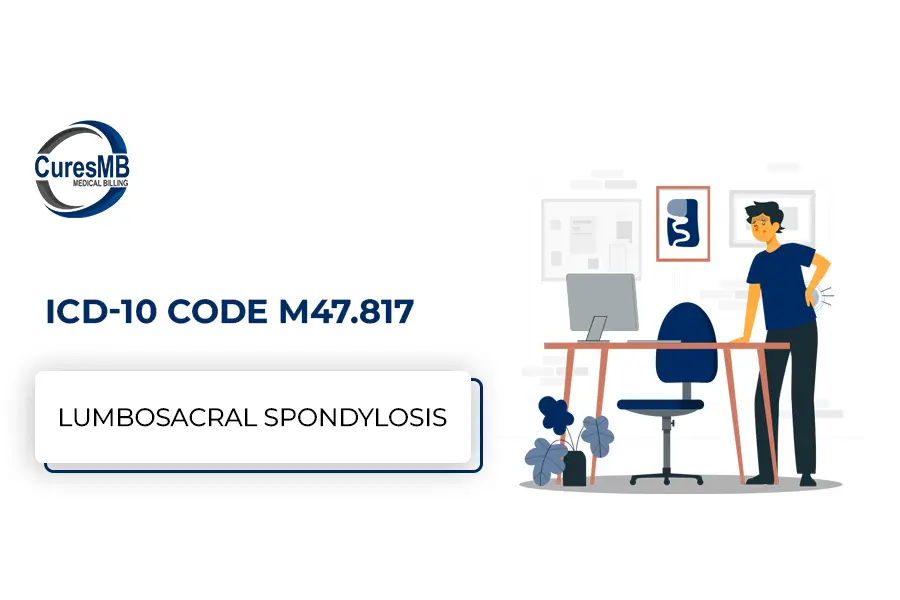
ICD-10 code M47.817 is assigned for lumbosacral spondylosis when there is degeneration of the spine without signs of myelopathy or radiculopathy. Clinically, spondylosis is a degenerative spine condition often associated with spinal osteoarthritis. It is commonly seen in older adults experiencing chronic low back pain.
This diagnosis code applies when imaging shows degenerative changes in the lumbosacral area but no evidence of nerve root compression or related complications. It should not be confused with radiculopathy-related codes or disc-specific conditions like degenerative disc disease.
Healthcare providers may also document this condition under terms like:
This diagnosis may be billed by:
Depending on payer policies, the following services are typically covered:
When paired with M47.817, common CPT codes include:
These CPT codes for lumbar spine conditions should always be linked correctly with the diagnosis to avoid denials.
Fill out the form below and we’ll contact you shortly.
Proper use of modifiers ensures accurate claim submission:
Correct ICD-10 to CPT charting for spondylosis is important to reduce payer denials.
Payers often require documented proof, such as imaging reports, to support lumbosacral spondylosis ICD-10 claims. Providers should also distinguish between degenerative disc disease and spondylosis, as miscoding can result in denials.
Thorough documentation ensures practices comply with payer rules while supporting maximum reimbursement.
At CuresMB, many practices are underpaid because of incorrect ICD-10 coding for spine conditions. Errors distinguishing lumbosacral spondylosis ICD-10 from related codes often lead to denials, delayed payments, and revenue leakage.
Our team specializes in:
Contact CuresMB today for a free consultation and protect your practice from underpayments.
ICD-10 Code | Condition | Use Case |
M47.817 | Lumbosacral spondylosis without myelopathy/radiculopathy | Degeneration in lumbosacral region, no nerve involvement |
M47.816 | Lumbar spondylosis without radiculopathy | Lumbar degeneration, no radiculopathy |
M47.26–M47.27 | Spondylosis with radiculopathy | Use when nerve root compression is documented |
M47.12 | Cervical spondylosis with myelopathy | Cervical region with spinal cord involvement |
Choosing the most specific code, such as lumbar spondylosis without radiculopathy, ICD-10, is critical for compliance and payment accuracy.
ICD-10 Code M47.817 is crucial for accurately coding lumbosacral spondylosis without nerve involvement. The right documentation and precise coding confirm compliance, reduce claim denials, and optimize reimbursements.
At Cures, we help providers streamline coding, eliminate errors, and capture every dollar their practice deserves. With our billing expertise, you can focus on patient care while we manage your revenue cycle.
It indicates lumbosacral spondylosis without myelopathy or radiculopathy.
That would be M47.816, specific to the lumbar region.
Yes, but it applies specifically to the lumbosacral spine region.
No. Spondylosis denotes to spinal combined degeneration, while degenerative disc disease affects the intervertebral discs.
Most denials occur due to lack of documentation, missing modifiers, or incorrect use of a more general pain code.
Discover Cures Medical Billing Services Across Different States
FL
NY
ML
CO
NJ
AZ
TX
CA
WA
We are a team of national medical billing service experts based in Astoria, NY, committed to providing ongoing value to our customers. We leverage technology and implement best practices to provide high-quality and cost-efficient medical billing solutions from domestic locations, enabling customers to achieve their business goals. Cures Medical Billing is the best option for any medical billing needs.
Medical billing around Astoria, NY, and beyond is our core competency and our specialists will efficiently manage all your billing needs. Our medical billing specialists have over 12 Plus years of experience with all security technologies to ensure data integrity for our customers. Using our medical billing service, anyone can make their medical billing task less resource-consuming.
Efficiency & precision in healthcare financial management with Cures Medical Billing, your trusted partner for smarter, faster, and more accurate billing solutions.
This site uses cookies. Read our Privacy Policy